- Home
- V. S. Naipaul
The Mystic Masseur Page 2
The Mystic Masseur Read online
Page 2
Father and son left Fourways that Sunday and took the bus to Princes Town. The old man wore his visiting outfit: dhoti, koortah, white cap, and an unfurled umbrella on the crook of his left arm. They knew they looked important when they got into the train at Princes Town.
‘Careful with your suit now,’ the old man said loudly, and his neighbours heard. ‘Remember you are going to the town college.’
When they got to St Joseph, Ganesh began to feel shy. Their dress and manner were no longer drawing looks of respect. People were smiling, and when they got off at the railway terminus in Port of Spain, a woman laughed.
‘I did tell you not to dress me up like this,’ Ganesh lied, and was near to sobbing.
‘Let them laugh,’ the old man replied in Hindi, and passed the palm of his hand over his thick grey moustache. ‘Jackasses bray at anything.’
‘Jackass’ was his favourite word of abuse, perhaps because the Hindi word was so rich and expressive: gaddaha.
They hurried to the house in Dundonald Street where Ganesh was to board, and Mrs Cooper, the tall and plump Negro landlady, laughed when she saw them but said, ‘The boy look like a real smart man, man.’
‘She is a good lady,’ the old man told Ganesh in Hindi. ‘You don’t have to worry about the food or anything here. She will look after you.’
Ganesh preferred not to remember what happened the next day when he was taken to school. The old boys laughed, and although he had not worn the khaki toupee, he felt uncomfortable in his khaki suit. Then there was the scene in the principal’s office: his father gesticulating with his white cap and umbrella; the English principal patient, then firm, and finally exasperated; the old man enraged, muttering, ‘Gaddaha! Gaddaha!’
Ganesh never lost his awkwardness. He was so ashamed of his Indian name that for a while he spread a story that he was really called Gareth. This did him little good. He continued to dress badly, he didn’t play games, and his accent remained too clearly that of the Indian from the country. He never stopped being a country boy. He still believed that reading by any light other than daylight was bad for the eyes, and as soon as his classes were over he ran home to Dundonald Street and sat on the back steps reading. He went to sleep with the hens and woke before the cocks. ‘That Ramsumair boy is a real crammer,’ boys laughed; but Ganesh never became more than a mediocre student.
A fresh mortification awaited him. When he went home for his first holidays and had been shown off again, his father said, ‘It is time for the boy to become a real brahmin.’
The initiation ceremony was held that very week. They shaved his head, gave him a little saffron bundle, and said, ‘All right, off you go now. Go to Benares and study.’
He took his staff and began walking away briskly from Fourways.
As arranged, Dookhie the shopkeeper ran after him, crying a little and begging in English, ‘No, boy. No. Don’t go away to Benares to study.’
Ganesh kept on walking.
‘But what happen to the boy?’ people asked. ‘He taking this thing really serious.’
Dookhie caught Ganesh by the shoulder and said, ‘Cut out this nonsense, man. Stop behaving stupid. You think I have all day to run after you? You think you really going to Benares? That is in India, you know, and this is Trinidad.’
They brought him back home. But the episode is significant.
His head was still practically bald when he went back to school, and the boys laughed so much that the principal called him and said, ‘Ramsumair, you are creating a disturbance in the school. Wear something on your head.’
So Ganesh wore his khaki toupee in the classroom until his hair grew again.
There was another Indian boy, called Indarsingh, living in the house at Dundonald Street. He was also at the Queen’s Royal College, and although he was six months younger than Ganesh he was three forms ahead. He was a brilliant boy and everybody who knew him said he was going to be a great man. At sixteen Indarsingh was making long speeches in the Literary Society Debates, reciting verses of his own at Recitation Contests, and he always won the Impromptu Speech Contests. Indarsingh also played all games, not very well, but he had the sportsman’s instincts and it was this that caused him to be held up to the boys as an ideal. Indarsingh once persuaded Ganesh to play fooball. When Ganesh bared his pale, jaundiced legs, a boy spat in disgust and said, ‘Eh, eh, your foot don’t see sun at all at all!’ Ganesh played no more football, but he remained friendly with Indarsingh. Indarsingh, for his part, found Ganesh useful. ‘Come for a little walk in the Botanical Gardens,’ he would say to Ganesh, and during the whole of the walk Indarsingh would talk non-stop, rehearsing his speech for the next debate. At the end he would say, ‘Good eh? Demn good.’ This Indarsingh was a short, square boy, and his walk, like his talk, had the short man’s jauntiness.
Indarsingh was Ganesh’s only friend, but the friendship was not to last. At the end of Ganesh’s second year Indarsingh won a scholarship and went to England. To Ganesh, Indarsingh had achieved a greatness beyond ambition.
In due course Ganesh wrote the Cambridge School Certificate and surprised everybody by passing in the second grade. Mr Ramsumair sent his congratulations to Ganesh, offered an annual prize to the college, and told Ganesh that he had found a nice girl for him to marry.
‘The old man really rushing you,’ Mrs Cooper said.
Ganesh wrote back that he had no intention of getting married, and when his father replied that if Ganesh didn’t want to get married he must consider himself an orphan, Ganesh decided to consider himself an orphan.
‘You have to get a work now,’ Mrs Cooper said. ‘Mind you, I not thinking about what you have to pay me, but still you must get a work. Why you don’t go and see your headmaster?’
So he did. The headmaster looked a little puzzled and asked, ‘What do you want to do?’
‘Teach,’ Ganesh said, because he felt he ought to flatter his headmaster.
‘Teach? Strange. Primary schools?’
‘What you mean, sir?’
‘You’re not thinking of teaching in this school?’
‘Nah, sir. You making joke.’
In the end, with the headmaster’s help, Ganesh was enrolled in the Government Training College for teachers in Port of Spain, where there were many more Indians, and he felt less ill at ease. He was taught many important subjects and from time to time he practised on little classes from schools near by. He learned to write on a blackboard and overcame his dislike of the sound of scraping chalk. Then they turned him out to teach.
They sent him to a school in a rowdy district in the east end of Port of Spain. The headmaster’s office was also a classroom choked up with young boys. The headmaster sat under a picture of King George V and gave Ganesh an interview.
‘You don’t know how lucky you is,’ he began, and jumped up immediately, saying, ‘Gimme a chance. It have a boy here I must give a good cut-arse to. Just gimme a chance.’
He squeezed his way between desks to a boy in the back row. The class was instantly silent and it was possible to hear the noise from the other classrooms. Then Ganesh heard the boy squealing behind the blackboard.
The headmaster was sweating when he came back to Ganesh. He wiped his big face with a mauve handkerchief and said, ‘Yes, I was telling you that you is a lucky man. Most of the times they just lose a new man like you somewhere in the country, all up by Cunaripo and all sorta outa the way places.’
The headmaster laughed and Ganesh felt he had to laugh too; but as soon as he did so the headmaster became stern and said, ‘Mr Ramsumair, I don’t know what views you have about educating the young, but I want to let you know right away, before we even start, that the purpose of this school is to form, not to inform. Everything is planned.’ He pointed to a framed time-table, done in inks of three colours, hanging next to the picture of King George V. ‘Miller, the man you replacing, paint that. He sick,’ the headmaster said.
‘It look good and I sorry Miller sick,’ Ganesh said
.
The headmaster leaned back in his chair and beat a ruler on the green blotter in front of him. ‘What is the purpose of the school?’ he asked suddenly.
‘Form – ’ Ganesh began.
‘Not – ’ the headmaster encouraged.
‘Inform.’
‘You quick, Mr Ramsumair. You is a man after my own heart. You and me going to get on good good.’
Ganesh was given Miller’s class, the Remove. It was a sort of rest-station for the mentally maimed. Boys remained there uninformed for years and years, and some didn’t even want to leave. Ganesh tried all the things he had been taught at the Training College, but the boys didn’t play fair.
‘I can’t teach them nothing at all,’ he complained to the headmaster. ‘You teach them Theorem One this week and next week they forget it.’
‘Look, Mr Ramsumair. I like you, but I must be firm. Quick, what is the purpose of the school?’
‘Form not inform.’
Ganesh gave up trying to teach the boys anything, and was happy enough to note a week-to-week improvement in his Record Book. According to that book, the Remove advanced from Theorem One to Theorem Two in successive weeks, and then moved on unexhausted to Theorem Three.
Having much time on his hands, Ganesh was able to observe Leep next door. Leep had been at the Training College with him, and Leep was still keen. He was nearly always at the blackboard, writing, erasing, constantly informing, except for the frequent occasions when he rushed off to flog some boy and disappeared behind the celotex screen which separated his class from Ganesh’s.
On the Friday before Miller was due back at the school (he had had a fractured pelvis), the headmaster called Ganesh and said, ‘Leep sick.’
‘What happen?’
‘He just say he sick and he can’t come on Monday.’
Ganesh leaned forward.
‘Now don’t quote me,’ the headmaster said. ‘Don’t quote me at all. But this is how I look at it. If you leave the boys alone, they leave you alone. They is good boys, but the parents – God! So when Miller come back, you have to take Leep class.’
Ganesh agreed; but he took Leep’s class for only one morning.
Miller was very angry with Ganesh when he returned, and at the recess on Monday morning went to complain to the headmaster. Ganesh was summoned.
‘I leave a good good class,’ Miller said. ‘The boys was going on all right. Eh, eh, I turn my back for a week – well, two three months – and when I turn round again, what I see? The boys and them ain’t learn nothing new and they even forget what I spend so much time trying to teach them. This teaching is a art, but it have all sort of people who think they could come up from the cane-field and start teaching in Port of Spain.’
Ganesh, suddenly angry for the first time in his life, said, ‘Man, go to hell, man!’
And left the school for good.
He went for a walk along the wharves. It was early afternoon and the gulls mewed amid the masts of sloops and schooners. Far out, he saw the ocean liners at anchor. He allowed the idea of travel to enter his mind and just as easily allowed it to go out again. He spent the rest of the afternoon in a cinema, but this was torture. He especially resented the credit titles. He thought, ‘All these people with their name in big print on the screen have their bread butter, you hear. Even those in little little print. They not like me.’
He needed all Mrs Cooper’s solace when he went back to Dundonald Street.
‘I can’t take rudeness like that,’ he told her.
‘You a little bit like your father, you know. But you mustn’t worry, boy. I can feel your aura. You have a powerhouse for a aura, man. But still, you was wrong throwing up a good work like that. It wasn’t as if they was working you hard.’
At dinner she said, ‘You can’t go and ask your headmaster again.’
‘No,’ he agreed quickly.
‘I been thinking. I have a cousin working in the Licensing Office. He could get you a job there, I think. You could drive motor car?’
‘I can’t even drive donkey-cart, Mrs Cooper.’
‘It don’t matter. He could always get a licence for you, and then you ain’t have to do much driving. You just have to test other drivers, and if you anything like my cousin, you could make a lot of money giving out licence to all sort of fool with money.’
She thought again. ‘And, yes. It have a man I know does work at Cable and Wireless. Eh, but my brain coming like a sieve these days. It have a telegram here for you, come this afternoon.’
She went to the sideboard and pulled an envelope from under a vase stuffed with artificial flowers.
Ganesh read the telegram and passed it to her.
‘What damn fool send this?’ she said. ‘It enough to make anybody dead of heart failure. Bad news come home now. Who is this Ramlogan who sign it?’
‘Never hear about him,’ Ganesh said.
‘What you think it is?’
‘Oh, you know …’
‘But ain’t that strange?’ Mrs Cooper interrupted. ‘Just last night I was dreaming about a dead. Yes, it really strange.’
3. Leela
ALTHOUGH IT WAS nearly half past eleven when his taxi got to Fourways that night, the village was alive and Ganesh knew that Mrs Cooper was right. Someone had died. He sensed the excitement and recognized all the signs. Lights were on in most of the houses and huts, there was much activity on the road, and his ears caught the faint hum, as of distant revelry. It wasn’t long before he realized that it was his father who had died. Fourways seemed to be waiting for the taxi and the moment people saw Ganesh sitting in the back they began to wail.
The house itself was chaos. He had hardly opened the taxi doors when scores of people he didn’t know scrambled towards him with outstretched arms, bawling; and led, almost carried, him into the house which was full of even more mourners he didn’t know or remember.
He could hear the taxi-driver saying over and over, ‘Man, I guess long time what the case was. We stepping on the gas all the way from Port of Spain, driving like madness all in the dark. And the boy so mash up inside he not even crying.’
A fat, sobbing man embraced Ganesh and said, ‘You get my telegram? Fust telegram I send. I is Ramlogan. You don’t know me but I know your father. Just yesterday, just yesterday’ – Ramlogan broke down and wept afresh – ‘just yesterday I meet him and I say, “Baba” – I does always call him that – “Baba,” I say, “come inside and have something to eat.” I take over Dookhie shop now, you know. Yes, Dookhie dead nearly seven months now and I take over the shop.’
Ramlogan’s eyes were red and small with weeping. ‘ “Baba,” I say, “come inside and have something to eat.” And you know what he say?’
A woman put her arms around Ganesh and asked, ‘What he say?’
‘You want to know what he say?’ Ramlogan embraced the woman. ‘He say, “No, Ramlogan. I don’t want to eat today.” ’
He could hardly finish the sentence.
The woman removed her hands from Ganesh and put them on her head. She shrieked, twice, then dropped into a wail: ‘ “No, Ramlogan, I don’t want to eat today.” ’
Ramlogan wiped his eyes with a thick hairy finger. ‘Today,’ he sobbed, holding out both hands towards the bedroom, ‘today he can’t eat at all.’
The woman shrieked again. ‘Today he can’t eat at all.’
In her distress she tore the veil off her face and Ganesh recognized an aunt. He put his hand on her shoulder.
‘You think I could see Pa?’ he asked.
‘Go and see your Pa, before he go for good,’ Ramlogan said, the tears running down his fat cheeks to his unshaved chin. ‘We wash the body and dress it and everything already.’
‘Don’t come with me,’ Ganesh said. ‘I want to be alone.’
When he had closed the door behind him the wailing sounded far away. The coffin rested on a table in the centre of the room and he couldn’t see the body from where he was. To his left a small oi
l lamp burned low and threw monstrous shadows on the walls and the galvanized-iron ceiling. When he walked nearer the table his footsteps resounded on the floor-planks and the oil lamp shivered. The old man’s moustache still bristled fiercely but the face had fallen and looked weak and tired. The air around the table felt cool and he saw that it came from the casing of ice around the coffin. It was a room of the dead, strange with the smell of camphor balls, and there was nothing alive in it except himself and the squat yellow flame of the oil lamp, and they were both silent. Only, from time to time, the water from the melting ice plopped into the four pans at the feet of the table and punctured the silence.
He didn’t know what he thought or felt but he didn’t want to cry and left the room. They were waiting for him to come out and quickly encircled him. He heard Ramlogan saying, ‘Come on, man, give the boy air. Is his father dead, you know. His only father.’ And the wailing began again.
No one asked him about plans for the cremation. Everything seemed arranged already and Ganesh was content that it should be so. He allowed Ramlogan to take him away from the house, with its sobs and shrieks and lamentations, its gas lamps, oil lamps, bottle flambeaux, bright lights everywhere except in the small bedroom.
‘No cooking here tonight,’ Ramlogan said. ‘Come and eat at the shop.’
Ganesh didn’t sleep that night and everything he did seemed unreal. Afterwards he remembered the solicitude of Ramlogan – and his daughter; remembered returning to the house where no fire could be lit, remembered the sad songs of the women lengthening out the night; then, in the early morning, the preparations for the cremation. He had to do many things, and he did without thought or question everything the pundit, his aunt, and Ramlogan asked him. He remembered having to walk round the body of his father, remembered applying the last caste-marks to the old man’s forehead, and doing many more things until it seemed that ritual had replaced grief.

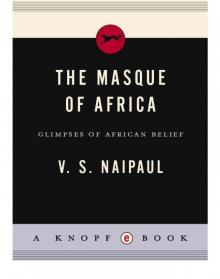 The Masque of Africa: Glimpses of African Belief
The Masque of Africa: Glimpses of African Belief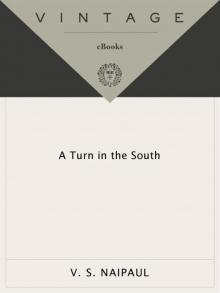 A Turn in the South
A Turn in the South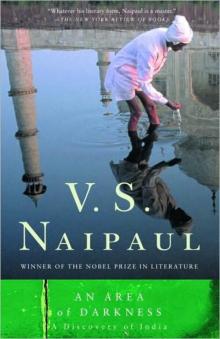 An Area of Darkness
An Area of Darkness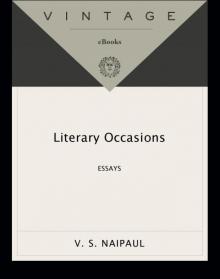 Literary Occasions: Essays
Literary Occasions: Essays A Way in the World
A Way in the World Among the Believers: An Islamic Journey
Among the Believers: An Islamic Journey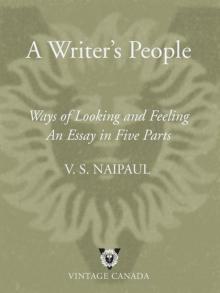 A Writer's People: Ways of Looking and Feeling
A Writer's People: Ways of Looking and Feeling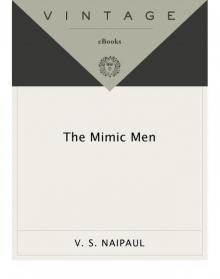 The Mimic Men: A Novel
The Mimic Men: A Novel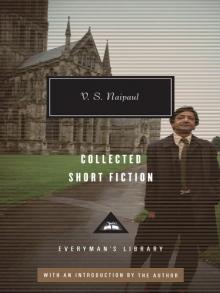 Collected Short Fiction
Collected Short Fiction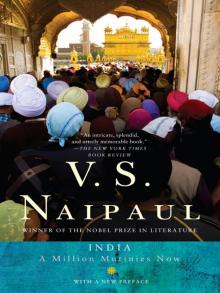 India: A Million Mutinies Now
India: A Million Mutinies Now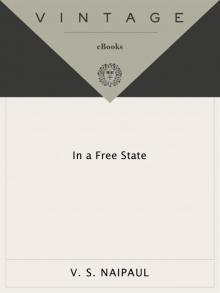 In a Free State
In a Free State Half a Life
Half a Life Beyond Belief: Islamic Excursions Among the Converted Peoples
Beyond Belief: Islamic Excursions Among the Converted Peoples Guerrillas
Guerrillas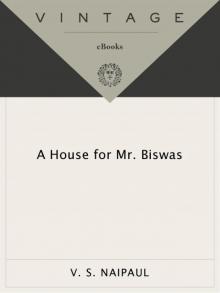 A House for Mr. Biswas
A House for Mr. Biswas The Writer and the World: Essays
The Writer and the World: Essays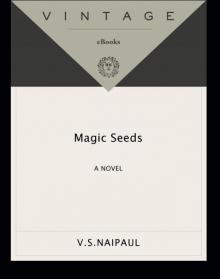 Magic Seeds
Magic Seeds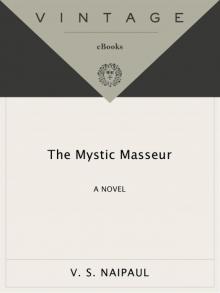 The Mystic Masseur
The Mystic Masseur Miguel Street
Miguel Street The Return of Eva Perón, With the Killings in Trinidad
The Return of Eva Perón, With the Killings in Trinidad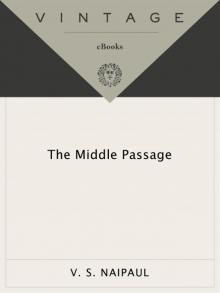 The Middle Passage
The Middle Passage A Bend in the River
A Bend in the River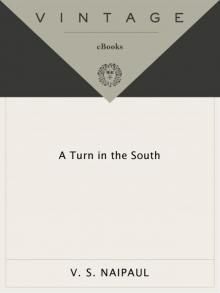 A Turn in the South (Vintage International)
A Turn in the South (Vintage International) Among the Believers
Among the Believers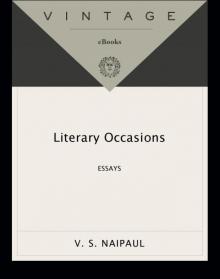 Literary Occasions
Literary Occasions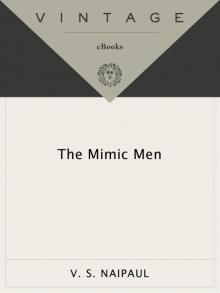 The Mimic Men
The Mimic Men The Writer and the World
The Writer and the World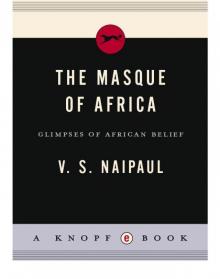 The Masque of Africa
The Masque of Africa